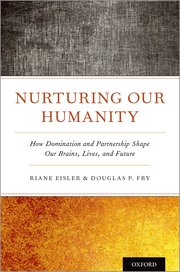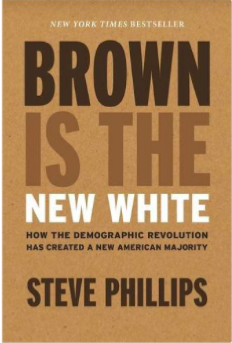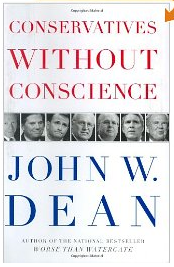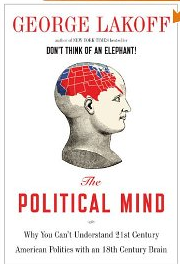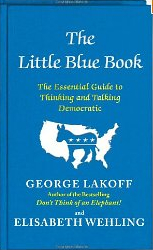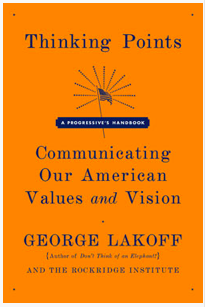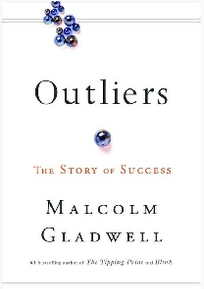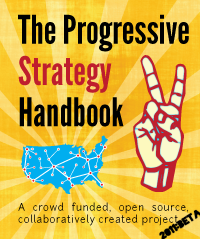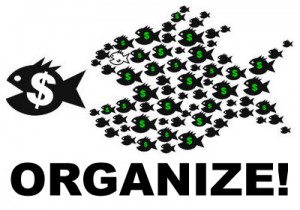Throughout this blog, I have written about those that have lead us into the current political mess in our country. They are the right wing authoritarians (RWAs): the social dominators like GWB, his VP Dick, and their followers.
They are the neocons that think they know best and use Noble Lies to fool us into supporting their preemptive-strike mentality. Many neocons are social dominators.
They are the extreme religious right that follow the social dominators without question and without conscience as John Dean has documented in Conservatives Without Conscience. The followers want Mike Huckabee for president. Other authoritarian followers have enabled the illegal activities (torture, suspension of habeas corpus, spying on us, etc.) of the social dominators to help them dominate.
Today, I will add another perspective to the authoritarians, who for now, in this country, tend to support the Republican party, and what they consider important relative to the rest of the country can be helpful. I will contrast their views with those of Democrats and Independents.
In January of this year, The Pew Research Center reported the results of their annual survey on 21 policy issues. One of the reports concentrated on global warming as an overall low level issue. At the end of the article, they provide a summary of these 21 issues. The rankings are based on how many of the respondents ranked the issue as their “top priority.”
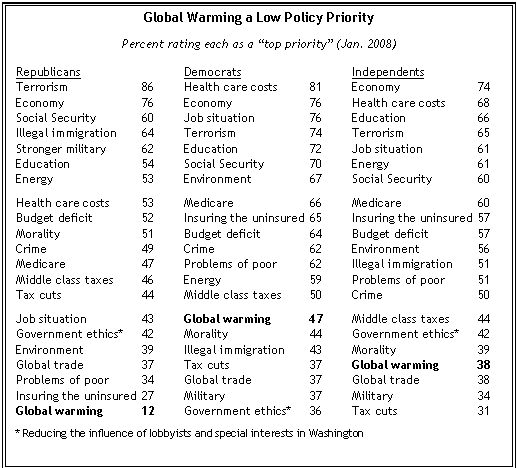
In a second article, they make a broader analysis of these issues. This article shows the changes in the ranking of these issues since 2007 and how the divide between Republicans and Democrats continues to widen.
Here are some excepts from this issue survey:
Only about a quarter of Republicans (27%) say that providing health insurance to the uninsured should be a top priority, down 17 points from January 2007. More than twice as many Democrats (65%) and independents (58%) now rate this as a major policy goal.
Democrats currently are about four times more likely than Republicans to rate global warming as a major priority (47% vs. 12%), a much greater gap than in January 2007 (48% Democrat vs. 23% Republican).
Nearly four-in-ten Democrats (39%) list an economic concern, compared with 27% of Republicans. Democrats are also substantially more concerned about Iraq than are Republicans (36% vs. 21%). By contrast, Republicans are more likely than Democrats to name immigration, terrorism and national security as the biggest problems.
Pew’s survey summarized these 21 issues for both Republicans and Democrats in the following table:
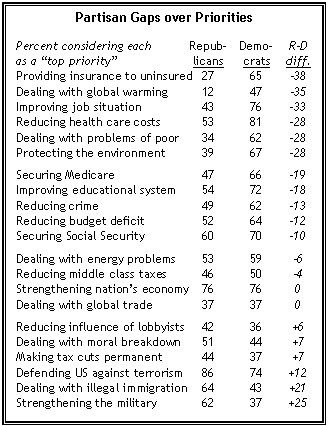
The report summarized some of the differences:
On jobs, for instance, 76% of Democrats and just 43% of Republicans say it should be a top priority for the President and Congress.
Notably, 81% of Democrats say that reducing healthcare costs should be a top priority for policymakers – the highest percentage for any issue mentioned. Only about half of Republicans (53%) view this as a major priority.
Republicans place greater priority on defending the U.S. against terrorism (86% for Republicans vs 74% for Democrats), dealing with the issue of illegal immigration (64% vs 43%), and strengthening the military (62% vs 37%).
What the report does not discuss is where the Independents stand on these issues and how they are more in agreement with the Democrats than with the Republicans (home of the RWAs). To evaluate this, you have to add Independents to the table above and then compare all three groups.
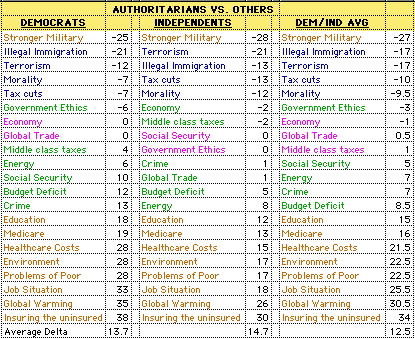
Average is of absolute values – the minus sign is excluded.
Analysis of table above shows:
- Democrats and Independents are in greatest agreement with each other and greatest disagreement with the Republicans on nine of the 21 issues. With these nine issues, the discordance between the average of the Democrat’s and Independent’s ratings, and the Republican’s rating ranges from 15 to 34 percentage points. Of these nine, one represents disagreement with a Republican high priority and the other eight represent disagreement with high priority issues of the Democrats and Independents.
- On four other issues, Democrats and Independents are in close agreement and also disagree with Republicans on some of their other higher priority items.
- Where Republicans are more concerned about foreigners (terrorists and immigrants) and strengthening our military to protect us from these enemies, Democrats and Independents are far less concerned by an average of 20 percentage points.
- Where Democrats and Independents are in greatest agreement on “providing insurance for the uninsured,” “dealing with global warming,” “improving job situation,” “dealing with problems of the poor,” “protecting the environment,” “reducing health care costs,” “securing Medicare,” and “improving educational system,” they are in greatest disagreement with Republicans by an average of 23 percentage points.
- Democrats are in greatest agreement with Republicans only on “strengthening the nation’s economy,” which ranked second for both parties, and “dealing with global trade,” which ranked in the bottom four for both groups.
- Independents are in greatest agreement with Republicans only on “securing social security,” which ranked among the top 7 of these groups and “reducing the influence of lobbyists” (Government Ethics), which ranked 16th for both groups.
Based on the above list, we have one group that is fearful of foreigners and want their national government to protect them from these enemies, and we have those that are more concerned about the well being of others, including themselves, their coworkers, their friends and their families.






